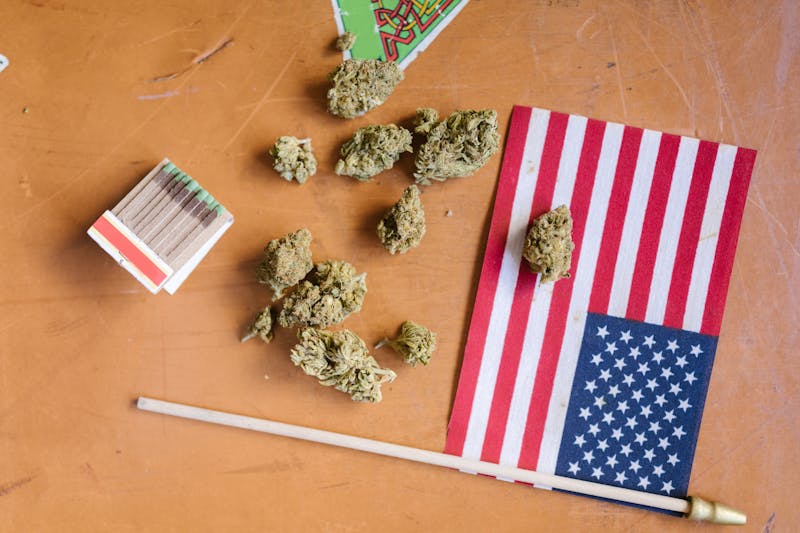As the country collectively exhales after a seemingly never-ending election season, the cannabis industry begins to lick its wounds following a resounding defeat at the polls. All adult-use initiatives failed, albeit by slim margins in several states. However, medical initiatives were approved in Nebraska, acting as a consolation prize on the national stage but a crucial step forward for patients in the state.
Here’s how it shook out in each state:
- Florida: Amendment 3, a proposal to legalize adult-use cannabis by embedding the reform into the state constitution, fell short of the 60% supermajority needed to pass, keeping recreational cannabis illegal in the state.
- Massachusetts: Voters narrowly rejected a measure to legalize medical psychedelics, with 57% opposed and 43% in favor. The initiative sought to allow the medical use of substances such as psilocybin, psilocin, DMT, ibogaine, and mescaline for patients 21 and older.
- North Dakota: In the state’s third attempt in six years, adult-use cannabis legalization was defeated, with 53% of voters opposing the reform and 47% in favor, signaling continued resistance to recreational cannabis in the region.
- South Dakota: Voters in South Dakota also turned down an adult-use cannabis legalization proposal, sustaining the state’s conservative stance on recreational marijuana.
- Nebraska: Two medical cannabis initiatives were approved, one legalizing medical cannabis and another creating a regulated market, with 71% and 67% support, respectively. However, ongoing legal challenges to these initiatives may impact the final implementation.
“While the failure to pass Amendment 3 in Florida is disappointing to many across the state, it is important to remember that Florida’s medical cannabis program remains robust and fully intact,” said Aaron Bloom, CEO of DocMJ. At DocMJ, our mission has always been to provide patients with access to effective and affordable medical cannabis tailored to their individual health needs. The medical marijuana program continues to offer significant benefits, including tax exemptions, higher possession limits, and access to potent, medical-grade products that adult-use markets typically do not provide. Though Florida has not moved forward with adult-use legalization, we remain focused on supporting our patients with the personalized care they depend on to manage their needs.”
“While we respect the voters’ decision, this was a missed opportunity,” said Greenlight Dispensary CEO and co-founder John Mueller. “South Dakota will continue to miss out on the economic and public safety benefits that come with a regulated adult-use cannabis market. The illicit market will persist, depriving the state of tax revenue and leaving consumers without tested, regulated products.
“Greenlight remains committed to our presence here and will continue advocating for safe, regulated adult-use access. Many states have successfully implemented adult-use programs, and we believe South Dakota will eventually follow suit.”
What Does Another Trump Presidency Mean for Cannabis Legalization?
While Kamala Harris’ recent announcement of her “Opportunity Agenda,” which includes an initiative to federally legalize cannabis, shows her emphatic support of the plant, Donald Trump’s position is less clear.
During his 2016 campaign, he supported medical marijuana and deferred recreational use decisions to individual states. However, his administration took a hardline approach, with then-Attorney General Jeff Sessions rescinding Obama-era guidelines that limited federal interference in state-legal cannabis activities.
In the lead-up to the 2024 election, Trump indicated a more progressive stance. In September 2024, he expressed support for reclassifying marijuana from a Schedule I to a Schedule III substance under the Controlled Substances Act, aligning it with drugs like ketamine and codeine. He stated, “It is time to end needless arrests and incarcerations of adults for small amounts of marijuana for personal use.”
Additionally, Trump endorsed Florida’s Amendment 3, a ballot initiative aimed at legalizing recreational marijuana for adults 21 and older. A Florida resident, he announced his intention to vote in favor of the measure, emphasizing the importance of state rights in determining cannabis policy.
While his recent endorsements suggest a potential shift toward reform, his administration’s past actions reflect a more stringent approach. Key considerations include:
- Federal rescheduling: Reclassifying marijuana to Schedule III could facilitate research and reduce penalties for cannabis-related offenses. However, it would stop short of full legalization, leaving significant regulatory decisions to individual states.
- State autonomy: Trump’s support for state-level decisions aligns with a federalist approach, potentially allowing states to continue setting their own cannabis policies without federal interference.
- Criminal justice reform: While Trump has expressed opposition to incarcerations for minor cannabis offenses, broader criminal justice reforms related to cannabis remain uncertain under his administration.
Trump’s recent statements indicate a more lenient stance on cannabis, but the extent to which his administration will pursue legalization or significant reform is yet to be determined. As stakeholders in the cannabis industry and advocates for legalization, we will be closely monitoring policy developments in the coming months.
Author
-

Aron Vaughan is a journalist, essayist, author, screenwriter, and editor based in Vero Beach, Florida. A cannabis activist and tech enthusiast, he takes great pride in bringing cutting edge content on these topics to the readers of Cannabis & Tech Today. See his features in Innovation & Tech Today, TechnologyAdvice, Armchair Rockstar, and biaskllr.






